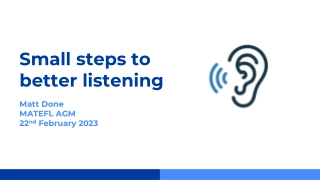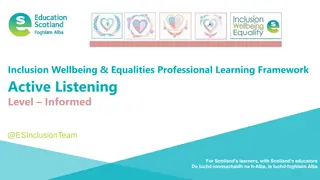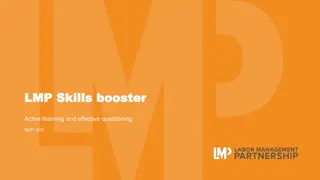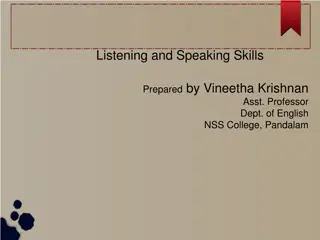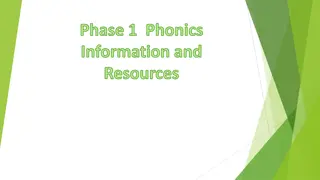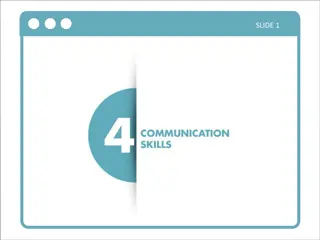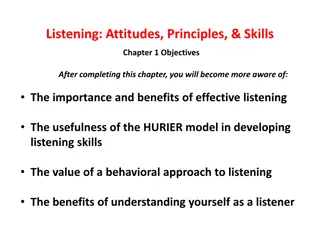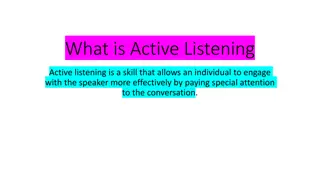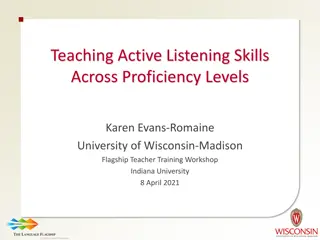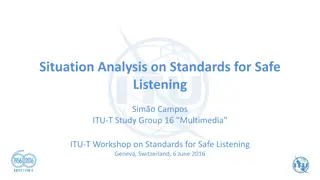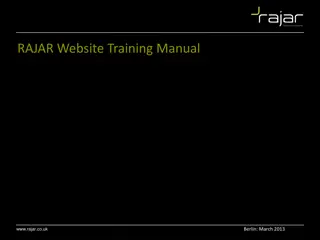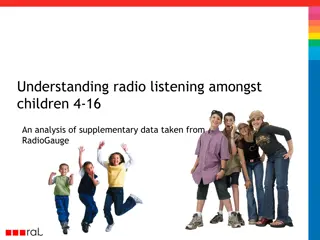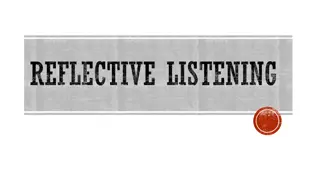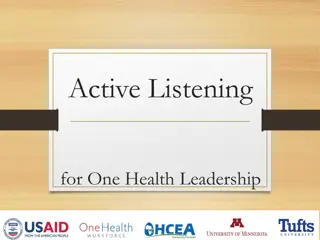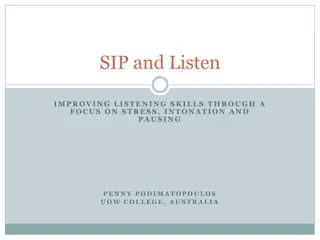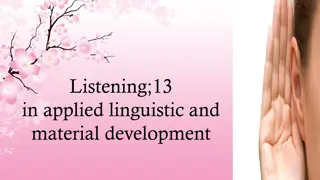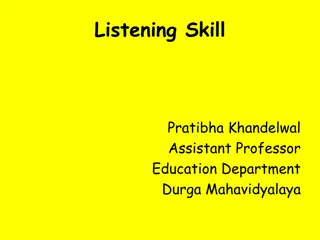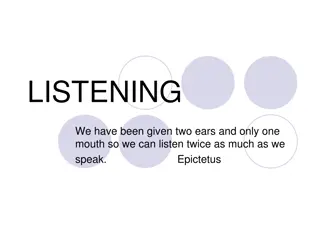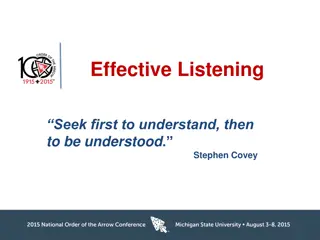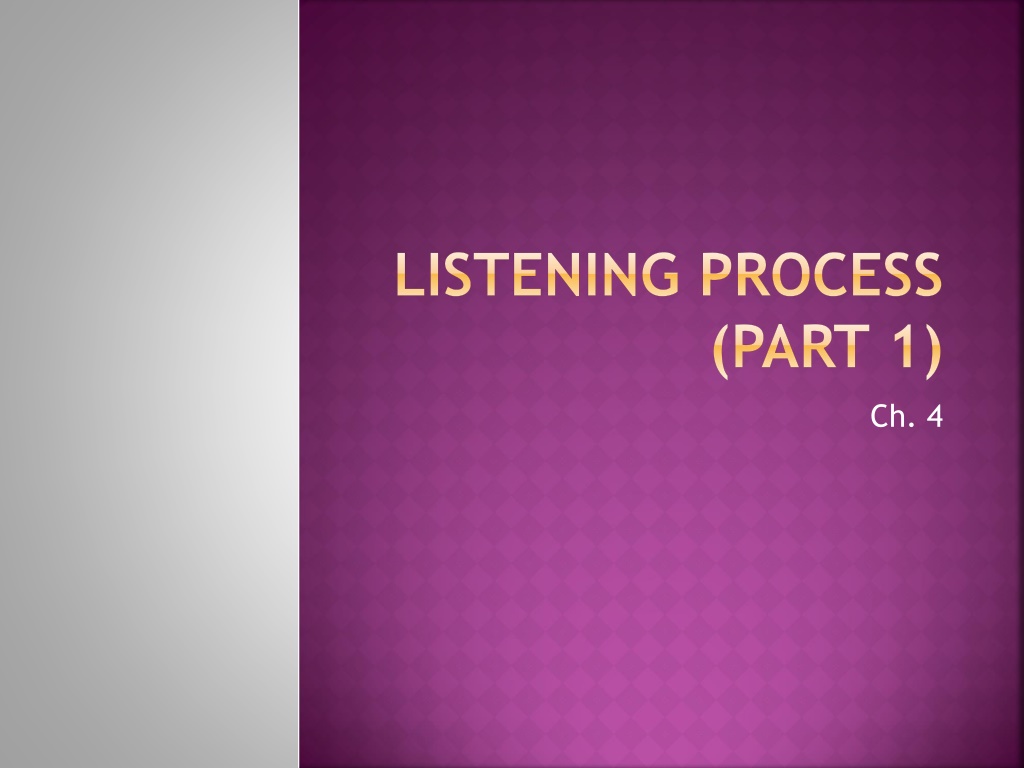
Effective Ways to Improve Your Listening Skills
Enhance your listening skills by understanding the difference between passive and active listening, realizing that listening goes beyond just hearing, learning the different ways to listen effectively, and overcoming common roadblocks to good listening.
Download Presentation

Please find below an Image/Link to download the presentation.
The content on the website is provided AS IS for your information and personal use only. It may not be sold, licensed, or shared on other websites without obtaining consent from the author. If you encounter any issues during the download, it is possible that the publisher has removed the file from their server.
You are allowed to download the files provided on this website for personal or commercial use, subject to the condition that they are used lawfully. All files are the property of their respective owners.
The content on the website is provided AS IS for your information and personal use only. It may not be sold, licensed, or shared on other websites without obtaining consent from the author.
E N D
Presentation Transcript
LISTENING PROCESS (PART 1) Ch. 4
PASSIVE VS. ACTIVE Passive listeners- let the speaker do all of the work while the listener is just along for the ride Ex. Putting up with distractions, paying more attention to someone s appearance than their message, and failing to respond to message Active listener- plays an active role by guiding the talker toward common interests Ex. Being engaged in the conversation, giving verbal cues that show you re paying attention
LISTENING IS MORE THAN HEARING Listening is the receiving part of the communication process, but just hearing the words is only the beginning. Hearing- sound waves that set off vibrations in our ears; automatic reaction of the senses and nervous system Listening- conscious effort to hear; voluntary act in which we use our higher mental processes.
(CONTINUED) We only remember about 25% of what we hear You must train yourself to listen. Most people speak at 120-180 words per minute. Our brains work faster than that which is why we tend to wander off.
4 WAYS TO LISTEN Appreciative Listening- listening for leisure or enjoyment Discriminative Listening- when we want to single out one particular sound from a noisy environment (ex: friend s voice in a crowded room) Empathic Listening- encourages people to talk freely without fear or embarrassment. (ex: counselors, psychiatrists, and good friends) Critical Listening- evaluating what you hear and deciding if the message is logical, worthwhile, or has value
ROADBLOCKS TO GOOD LISTENING Tuning out dull topics Listen for something that you can use; an idea, quote, or story. Can almost always find something of value Faking Attention Translate the speaker s thoughts into your own words Repeat key points to yourself throughout the conversation
ROADBLOCKS TO GOOD LISTENING Yielding to Distractions Giving our attention to a distraction rather than the speaker Almost any distraction can be blocked out with concentration Criticizing delivery or physical appearance Don t use poor physical appearance or poor delivery skills as a reason not to listen Overlook their imperfections and listen to the message
ROADBLOCKS TO GOOD LISTENING Jumping to Conclusions Avoid personal biases Don t judge the message just by observations Overreacting to Emotional Words Avoid strong emotional reactions Don t let your emotions act as filters Interrupting Don t get caught up in thinking about what you want to say rather than listening Shows you don t care about what the other person is saying
FILTERS THAT DISTORT Education Religion Biases Family Attitude Physical Condition Age Morals Experience Emotions
AVOIDING FILTERS Refrain from judging the speaker Focus attention on the message Search for areas of agreement Keep an open mind
LISTENING PROCESS (PT. 2) Ch. 4
LISTENING TO A SPEECH The Beginning May be the most interesting but is usually not the most important Often to get caught up in the entertainment of the speech and to miss the key point Shortly after the beginning, the main idea will be presented If you miss the main idea, you don t know what to listen for
THE MIDDLE Be a critical listener Understand the message Test the strength of the message Question the support they use to back up their points What are their examples? Evaluate for accuracy and fairness
THE END Be on guard for emotional appeals and propaganda Listen for the repeated statement of the main idea, summary of the important support, or in conclusion Try and recognize if the speaker is trying to mislead you Be aware of rhetorical devices or tricks of language
E.A.R.S. Explore- What does this person want me to believe? Listen to see if you guessed right. Analyze- Are the reasons, examples, and facts convincing? Review- mentally run over the points that have already been made Search- listen between the lines. Are there hidden meanings in the message?
LISTENING IN THE WORKPLACE Being introduced to others Repeat their name two or three times in conversation Relate their name to something familiar Develop a determination to remember
ACCEPTING CRITICISM Be coachable 2 obstacles that make criticism hard to take: Threatens to distract us Don t dwell on the past Be proactive and make things better for the future It hurts Try not to take it personally Try to separate your behaviors from your ego
TIPS TO REMEMBER Ask for explanations if you don t understand Paraphrase the message in your own words Summarize the message Take notes Always have something to write with Don t worry about neatness Don t use complete sentences

